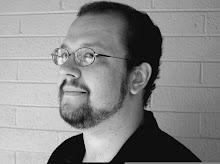Last Monday, I was testing out some technology stuff in one of the dance studios on campus. A couple students helped me, and they were very generous with their time (thanks, BTW).
I'm working on using the Wii Fit Balance Board as a music controller. The Balance Board is a little bit bigger than a bathroom scale and made of a similar white plastic. Each of its corners has a pressure sensor, and those four sensors send pressure information over a Bluetooth connection to whatever it's paired with. When it's paired with a Wii console, it lets you know what your body mass index is, or if you're holding a particular yoga posture correctly. If you pair it with a computer running the OSCulator program, you can change the pressure information to Open Source Control or MIDI messages, and that information can affect parameters of music programs running on the same computer. Cool.
The question that I asked at the beginning of that process was, "Can I make the Balance Board control sound in predictable, reliable, and useful ways?"
While OSCulator converts the raw data into MIDI messages, it can only send messages along five channels (four individual sensors, and their sum), so if I want to control more than five parameters in any given setup, I need something else. Max/MSP, here I come. Max also lets me adjust the "sensitivity" of the board (I can decide whether light or heavy pressure maxes out the MIDI control value) and route the incoming data channels to any controller numbers I like. Cool. Ableton Live can house the sounds and synths, and will accept MIDI control for tons of parameters. Cool cool.
The answer to the first question is yes. But it's not a very interesting or useful question. What question am I really asking?
YOU WILL SPEND A GREAT DEAL OF YOUR TIME ANSWERING QUESTIONS THAT ARE CONTINGENT, SITUATIONAL, AND LIMITED IN SCOPE AND USEFULNESS. These questions are necessary to answer-- we wouldn't spend our time on them if they were not. But every one of these little questions is connected, like branch to trunk, to a Big Question. You need the know the Big Question from which your question sprouts.
Big Questions have the following traits:
Interrogating the little question points you toward the Big Question. Why the Balance Board? The world is full of boxes that spit out numbers. Why this box?• They breed many little questions.
• They have many answers.
• Thinking about them generates little sparks in your head.
It's a box that's perfectly suited not for musicians, but dancers. Put a couple of those boards on stage, and choreography will generate data streams that can be used to influence the sound environment. No wires. This is not cool. This is COOL.
The Big Question here is: "What interesting things would happen if dancers were able to directly affect their sound environment in performance?"
• It generates little questions. (What other tools could I use to gather data from movement? Piezo-amplified objects? Photoresistors? Theremin-style capacitive antennas? Do dancers want this responsibility on top of all their other performance obligations? How am I going to avoid a Mickey-Mouse relationship between the sound and movement? Has anyone else done this? Etc.)
• It has many answers. (I would have an new layer of technology to assemble and debug. I would be able to compose accompaniments that didn't require me or the dancers to synchronize events by rote. I would become much more deeply involved in the creation of the choreography. Many things I haven't thought of yet.)
•It generated sparks. I want to explore this.
Knowing your Big Question(s), and interrogating them effectively, will generate new material. Knowing your Big Questions will also help you remember why you do what you do when you get tired of dealing with piles of little questions.
What question are you really asking?



